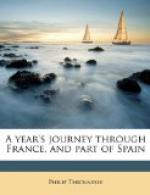Not far from Avignon, on the banks of the same rapid river, stands Beaucaire, famous for its annual FAIR, where merchandize is brought from all parts of Europe, free of all duties: it begins on the 22d of July; and it is computed that eight million of livres are annually expended there in eight days. Avignon is remarkable for the No. Seven, having seven ports, seven parishes, seven colleges, seven hospitals, and seven monasteries; and I may add, I think, seven hundred bells, which are always making a horrid jingle, for they have no idea of ringing bells harmoniously in any part of France.
LETTER XL.
LYONS.
After a month’s residence at Avignon, where I waited till the weather and roads amongst the high Dauphine mountains were both improved, I sat out for this city. I had, you know, outward bound, dropt down to Port St. Esprit by water, so it was a new scene to us by land, and I assure you it was a fine one; the vast and extensive rich vales, adorned on all sides with such romantic mountains, could not be otherwise, in such a climate. Our first stage was only four leagues to Orange; this is the last town in the Pope’s territories; and within a quarter of a mile of it stands, in a corn field, a beautiful Roman triumphal arch, so great in ruins, that it would be an ornament even in Rome. The Palais Royal at this town, has nothing to recommend it, but that it affords a prospect of this rich morsel of antiquity.
From Orange we passed through Pierlaite, Donzeir, and several smaller towns, and we lay one night at a single house, but an excellent auberge, called Souce, kept by an understanding sensible host.
At a little village called A’tang, on the banks of the Rhone, we stopped a day or two, to enjoy the sweet situation. Just opposite to it, on the other side of the river, stands a large town, (Tournau,) which added to the beauty of our village, over which hangs a very high mountain, from whence the best Hermitage wine is collected: I suppose it is called Hermitage, from a Hermit’s cell on the top of it; but so unlike the Montserrat Hermitages, that I contented myself with only tasting the Hermit’s wine; it was so good indeed, that though I did not see how it was possible to get it safe to the north side of France, I could not withstand the temptation of buying a cask, for which I was to pay twelve guineas, and did pay one as earnest, to a very sensible, and I believe honest and opulent wine merchant, who, however, made me a present of two bottles when I came away, almost worth my guinea; it is three livres a bottle on the spot; and he shewed me orders he had received from men of fashion in England, for wine; among which was one from Mr. Ryder, Sir Dudley Ryder’s son I fancy, who, I found, was well satisfied with his former dealings. Do you know that Claret is greatly improved by a mixture of Hermitage, and that the best Claret we have in England is generally so adulterated?




